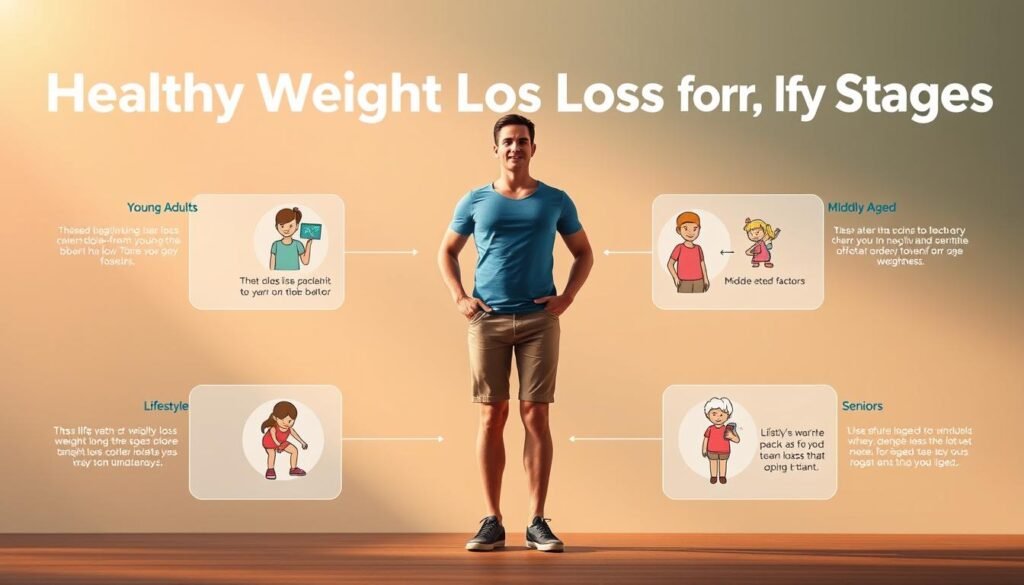Unlock the Secrets to Successful Weight Loss Today

A staggering 66% of adults in the United States are struggling with excess weight, according to recent statistics. This highlights the need for effective weight management strategies.
The key to successful weight management lies in adopting a holistic approach, focusing on sustainable lifestyle changes rather than quick fixes. The Mayo Clinic emphasizes the importance of a balanced diet and regular physical activity in achieving and maintaining a healthy weight.
Key Takeaways
- Adopting a holistic approach is crucial for successful weight management.
- A balanced diet and regular physical activity are essential.
- Sustainable lifestyle changes lead to long-term results.
- Focusing on overall well-being, rather than just weight, is vital.
- A healthy weight reduces the risk of chronic diseases.
The Science Behind Effective Weight Loss
To lose weight sustainably, it’s crucial to grasp the underlying science. Effective weight loss is not just about following the latest diet trends, but understanding how your body works and using that knowledge to your advantage.
How Your Body Burns Calories
Your body burns calories through a process called metabolism. Metabolism is influenced by several factors including your age, gender, weight, and activity level. The more muscle mass you have, the higher your metabolic rate tends to be. This is why incorporating strength training into your fitness routine can be beneficial for weight loss.
When you consume food, your body uses the nutrients to fuel various bodily functions, including physical activity. The energy from the food is measured in calories. If you consume more calories than your body needs, the excess is stored as fat. Conversely, when you consume fewer calories than you burn, your body uses the stored fat for energy, leading to weight loss.
Understanding Energy Balance
Energy balance is the key to weight management. It is achieved when the number of calories consumed equals the number of calories burned. To lose weight, you need to create a calorie deficit by either consuming fewer calories or increasing your physical activity.
The Centers for Disease Control and Prevention (CDC) recommend aiming for a weight loss of 1-2 pounds per week for a sustainable weight loss journey. This can be achieved by creating a daily calorie deficit of 500-1000 calories through a combination of diet and exercise.
| Activity Level | Daily Calorie Needs for Weight Loss | Daily Calorie Needs for Weight Maintenance |
|---|---|---|
| Sedentary | 1,500-1,800 | 2,000-2,400 |
| Moderately Active | 1,800-2,200 | 2,400-2,800 |
| Active | 2,000-2,400 | 2,800-3,000 |
By understanding how your body burns calories and maintaining an energy balance, you can make informed decisions about your diet and exercise routine, leading to sustainable weight loss. Incorporating dieting tips that focus on nutrient-dense foods and regular physical activity will help you achieve your weight loss goals.
Setting Realistic Weight Loss Goals
Setting the right weight loss goals is crucial for a successful journey to a healthier you. When you set realistic goals, you’re more likely to stay motivated and track your progress effectively.
According to the NHS, setting achievable goals such as losing 1-2 pounds per week is a recommended approach. This rate of weight loss is not only sustainable but also healthier in the long run.
Determining Your Healthy Weight Range
Understanding what constitutes a healthy weight range for you is the first step in your weight loss journey. Factors such as age, gender, height, and body composition play a significant role in determining this range.
- Consult with a healthcare professional to understand your ideal weight range.
- Use BMI calculators as a preliminary guide, though they may not be entirely accurate for everyone.
- Consider body fat percentage measurements for a more precise assessment.
Creating Achievable Milestones
Once you’ve determined your healthy weight range, the next step is to create achievable milestones. Breaking down your overall goal into smaller, manageable targets can make the task less daunting and more rewarding.
For example, instead of focusing solely on the end goal, you can set milestones such as:
- Exercising for 30 minutes, three times a week.
- Eating five servings of fruits and vegetables daily.
- Reducing daily sugar intake.
Sharing your weight loss plans with someone you trust can also provide an added layer of motivation and support.

By setting realistic goals and creating achievable milestones, you’re not just working towards losing weight; you’re embarking on a transformative journey towards a healthier lifestyle.
The Foundation of Healthy Weight Loss
Healthy weight loss is not about quick fixes, but rather about adopting a sustainable lifestyle that promotes overall well-being. At its core, successful weight loss is driven by a combination of a balanced diet and regular physical activity.
Caloric Deficit: The Core Principle
A fundamental principle of weight loss is achieving a caloric deficit, where the body burns more calories than it consumes. According to the Mayo Clinic, creating this deficit is crucial for losing weight and maintaining weight loss over time. This can be achieved through a combination of reducing calorie intake and increasing physical activity.
For instance, a person aiming to lose weight might start by reducing their daily calorie intake by 500 calories and increasing their physical activity to burn an additional 250 calories. This creates a total caloric deficit of 750 calories per day, leading to a sustainable weight loss of about 1.5 pounds per week.
“The key to successful weight loss is not about being on a diet, but making sustainable lifestyle changes that you can maintain in the long term.” –
Sustainable vs. Crash Diets
When it comes to dieting, there are two main approaches: sustainable eating habits and crash diets. While crash diets may offer quick results, they are often unsustainable and can lead to nutrient deficiencies and other health issues.
| Diet Approach | Sustainability | Health Impact |
|---|---|---|
| Sustainable Eating | High | Positive |
| Crash Diets | Low | Negative |
Incorporating exercise for weight loss is also vital. Regular physical activity not only burns calories but also builds muscle mass, which further supports metabolism. A balanced routine that includes both cardio and strength training can enhance natural weight loss efforts.
Ultimately, the journey to healthy weight loss is about making informed choices that lead to long-term success. By focusing on a caloric deficit, adopting sustainable eating habits, and incorporating regular exercise, individuals can achieve their weight loss goals and maintain a healthy lifestyle.
Nutrition Strategies That Drive Results
Effective weight management is rooted in understanding the nutritional strategies that drive results. A well-balanced diet is crucial for achieving and maintaining weight loss. The Academy of Nutrition and Dietetics suggests focusing on balanced macronutrients and practicing portion control to manage weight effectively.
Balanced Macronutrients for Optimal Results
A balanced diet consists of the right mix of macronutrients: carbohydrates, proteins, and fats. Each plays a vital role in overall health and weight management.
- Carbohydrates: Provide energy for the body. Focus on whole grains, fruits, and vegetables.
- Proteins: Essential for muscle repair and growth. Include lean proteins like poultry, fish, and legumes.
- Fats: Important for hormone production and brain function. Choose healthy fats found in nuts, seeds, and avocados.
Balancing these macronutrients helps in maintaining a healthy metabolism and supports weight loss efforts. For instance, a diet rich in protein can help reduce hunger and increase the feeling of fullness, making it easier to stick to a weight loss plan.

Portion Control Techniques
Controlling portion sizes is critical for managing calorie intake and achieving weight loss. Here are some effective techniques:
- Measure Your Food: Use measuring cups or a food scale to gauge your portions accurately.
- Eat Slowly: Take your time while eating to allow your body to signal when it’s full.
- Avoid Distractions: Turn off the TV and put away your phone to focus on your meal.
- Use Smaller Plates: This can help create the illusion of a fuller plate, reducing the tendency to overeat.
By implementing these portion control techniques, individuals can better manage their calorie intake and support their weight loss journey. It’s also important to be mindful of the overall quality of the diet, focusing on whole, nutrient-dense foods rather than processed or high-calorie options.
Incorporating these nutrition strategies into daily life can significantly enhance weight management efforts. By focusing on balanced macronutrients and effective portion control, individuals can achieve a healthier and more sustainable weight loss.
Meal Planning for Weight Loss Success
Planning your meals in advance is a strategy backed by health experts for losing weight sustainably. By dedicating time to meal planning, you can avoid last-minute, unhealthy food choices that often derail weight loss efforts.
Weekly Meal Prep Basics
Effective meal prep involves more than just cooking in bulk; it’s about creating a balanced diet that supports your weight loss goals. Start by planning your meals around balanced macronutrients, ensuring you have the right mix of proteins, carbohydrates, and fats.
- Begin with a meal plan that outlines your daily meals and snacks for the week.
- Make a grocery list based on your meal plan to avoid buying unnecessary items.
- Prep your meals in containers to make them easy to grab and go.
By following these steps, you can save time during the week and stay on track with your weight loss goals.
Smart Grocery Shopping Tips
Grocery shopping is a critical component of meal planning. To shop smart, focus on purchasing whole, nutrient-dense foods that align with your meal plan.
| Food Category | Healthy Choices | Tips |
|---|---|---|
| Proteins | Lean meats, fish, eggs, tofu | Choose organic or grass-fed when possible |
| Vegetables | Leafy greens, broccoli, bell peppers | Opt for seasonal produce for freshness |
| Grains | Whole wheat, quinoa, brown rice | Avoid processed grains |
By making informed choices at the grocery store, you can set yourself up for success in your weight loss journey.
Incorporating meal planning into your lifestyle can significantly enhance your weight loss efforts. By planning your meals and shopping smart, you can take control of your nutrition and move closer to your goals.
Exercise Approaches for Weight Loss
The right exercise approach can make all the difference in your weight loss journey, enhancing both physical and mental well-being. Exercise not only burns calories but also builds muscle and boosts metabolism, all of which are critical for losing weight and maintaining weight loss.
When designing an exercise regimen for weight loss, it’s essential to consider the types of activities that will help you achieve your goals. The American Heart Association recommends at least 150 minutes of moderate-intensity aerobic activity or 75 minutes of vigorous-intensity aerobic activity or a combination of both, preferably spread throughout the week.
Cardio vs. Strength Training Benefits
Two primary forms of exercise are cardio and strength training, each offering unique benefits for weight loss.
- Cardio Exercises: Activities like running, cycling, and swimming are excellent for burning calories during the workout. They improve cardiovascular health and can be adapted to different intensity levels.
- Strength Training: This involves using weights or resistance to build muscle. While it may not burn as many calories during the exercise itself, it increases resting metabolic rate, helping the body burn more calories at rest.
| Exercise Type | Primary Benefits | Examples |
|---|---|---|
| Cardio | Burns calories during exercise, improves cardiovascular health | Running, cycling, swimming |
| Strength Training | Builds muscle, increases resting metabolic rate | Weightlifting, bodyweight exercises, resistance band exercises |
Finding Activities You Actually Enjoy
Enjoyment is a crucial factor in sticking to an exercise routine. When you enjoy the activities you’re doing, you’re more likely to continue them over time.
Experiment with different types of exercises to find what you like. Whether it’s team sports, solo activities, or group fitness classes, there’s something out there for everyone. The key is to find activities that you look forward to, making exercise feel less like a chore.

By combining a balanced exercise routine with a healthy diet, you can achieve significant weight loss and improve your overall health. Remember, the best exercise is one that you enjoy and can stick to in the long term.
The Mind-Body Connection in Weight Management
Achieving natural weight loss requires more than just dieting; it demands a harmonious mind-body connection. Understanding this connection is crucial for a successful weight loss journey.
Managing Emotional Eating Triggers
Emotional eating is a significant obstacle in the weight loss journey. It involves consuming food in response to emotional states rather than hunger. Mindful eating practices can help individuals become more aware of their emotional triggers and develop healthier coping mechanisms.
To manage emotional eating, it’s essential to identify your triggers. Common triggers include stress, boredom, and emotional states like sadness or anxiety. Once you’re aware of your triggers, you can develop strategies to cope with them without turning to food.
| Trigger | Coping Strategy |
|---|---|
| Stress | Meditation or deep breathing exercises |
| Boredom | Engaging in a hobby or physical activity |
| Emotional states | Journaling or talking to a friend |
Developing a Positive Relationship with Food
Developing a positive relationship with food is vital for sustainable weight loss. This involves viewing food as nourishment rather than a source of comfort or stress relief. Mindful eating can help you enjoy your food more and feel more satisfied with smaller portions.
To cultivate this positive relationship, practice eating slowly, savoring your food, and paying attention to hunger and fullness cues. Avoid distractions like TV or smartphones during meals.
By understanding and leveraging the mind-body connection, individuals can achieve a more natural weight loss and maintain it over time. This holistic approach not only supports physical health but also enhances mental well-being.
Overcoming Common Weight Loss Plateaus
A weight loss plateau is not a sign of failure but an opportunity to reassess and readjust your weight management plan. It’s a common phenomenon where the body gets accustomed to the diet and exercise routine, leading to a stall in weight loss. According to the Mayo Clinic, adjusting diet and exercise routines can help overcome this plateau.

Why Progress Stalls
Several factors contribute to a weight loss plateau. One major reason is that the body adapts to the caloric deficit by reducing its metabolic rate, making it harder to lose weight. Another factor is the loss of muscle mass, which can slow down metabolism further.
Additionally, inconsistent dieting and lack of physical activity can also stall weight loss progress. It’s essential to understand that the body is highly adaptive, and what worked initially may not continue to work over time.
Strategies to Restart Your Progress
To overcome a weight loss plateau, consider the following dieting tips:
- Reassess your caloric intake and adjust it according to your current weight and activity level.
- Incorporate a variety of exercises, including strength training, to build muscle and boost metabolism.
- Monitor your portion sizes and avoid overeating, even on healthy foods.
- Stay hydrated and limit intake of high-calorie beverages.
It’s also beneficial to mix up your exercise routine to avoid plateaus. This could mean trying new activities or increasing the intensity of your workouts. Remember, the key to successful weight management is consistency and patience.
By understanding why progress stalls and implementing these strategies, you can overcome the plateau and continue towards your weight loss goals.
Tracking Your Progress Beyond the Scale
Tracking progress beyond the scale can provide a more comprehensive understanding of your health journey. While weight is an important metric, it’s not the only indicator of successful weight loss.
Body Measurements and Composition
Monitoring body measurements and composition can offer valuable insights into your progress. This includes tracking changes in body fat percentage, waist circumference, and muscle mass.
| Measurement | Initial Value | Current Value | Change |
|---|---|---|---|
| Weight (lbs) | 180 | 165 | -15 |
| Body Fat (%) | 30 | 25 | -5 |
| Waist Circumference (inches) | 38 | 35 | -3 |
As fitness expert Michelle Obama once said, “The most important thing is to be consistent and patient; progress may be slow, but it’s worth it.”
Non-Physical Indicators of Success
Non-physical indicators, such as increased energy levels, improved mood, and better sleep quality, are also crucial markers of progress.
“The biggest reward for doing something is not getting paid for it, but doing it.” –
- Increased energy levels
- Improved mood
- Better sleep quality
- Enhanced overall well-being
By focusing on these diverse metrics, you can gain a more nuanced understanding of your progress and stay motivated on your journey to healthy weight loss.
Lifestyle Habits That Support Weight Management
Weight management goes beyond just exercise and nutrition; it involves cultivating healthy daily habits. Two critical aspects that significantly impact our ability to lose weight and maintain weight loss are sleep quality and stress management.
Sleep Quality and Weight Connection
Good sleep quality is essential for overall health, and it plays a significant role in weight management. The NHS emphasizes that poor sleep can affect hormones that regulate hunger, leading to weight gain. Ensuring you get adequate, high-quality sleep is crucial.
Research has shown that sleep deprivation can lead to increased levels of the hunger hormone ghrelin and decreased levels of the fullness hormone leptin. This hormonal imbalance can result in increased appetite and calorie intake, making it harder to lose weight.
“Sleep is essential for weight regulation, and poor sleep can undermine even the best diet and exercise efforts.”
To improve sleep quality, establish a consistent sleep schedule, create a relaxing bedtime routine, and optimize your sleep environment. Avoid caffeine and electronics before bedtime to enhance sleep quality.
| Sleep Improvement Strategy | Benefit |
|---|---|
| Consistent Sleep Schedule | Regulates body’s internal clock |
| Relaxing Bedtime Routine | Signals body to prepare for sleep |
| Optimized Sleep Environment | Enhances sleep quality |
Stress Management Techniques
Stress is another significant factor that can impact weight management. Chronic stress can lead to emotional eating and increased storage of fat, particularly around the abdominal area. Effective stress management is crucial for maintaining a healthy weight.
Techniques such as meditation, yoga, and deep breathing exercises can help manage stress levels. Engaging in regular physical activity, such as exercise for weight loss, can also help reduce stress.

Finding healthy ways to cope with stress is vital. This can include hobbies, spending time with loved ones, or simply taking a walk. By managing stress effectively, individuals can better support their weight loss efforts and overall well-being.
- Meditation and mindfulness practices
- Regular physical activity
- Healthy coping mechanisms
By incorporating these lifestyle habits into daily life, individuals can better support their weight management goals and improve their overall health.
When to Seek Professional Help
The journey to a healthier weight is not always straightforward, and there are times when professional assistance is necessary. While many resources are available for those looking to lose weight, some individuals may benefit from more personalized guidance.
According to the Mayo Clinic, seeking professional help is particularly recommended for those with significant weight to lose or health concerns. Professional guidance can provide a tailored approach to weight loss, addressing specific needs and challenges.
Medical Supervision Benefits
One of the key benefits of seeking professional help is medical supervision. Healthcare professionals can monitor your progress, adjust your plan as needed, and provide support for any health issues that arise during your weight loss journey. This is especially important for individuals with pre-existing health conditions or those taking medications that could be affected by weight loss.
Medical supervision can help in several ways:
- Identifying and managing potential health risks associated with weight loss
- Adjusting medication as weight loss progresses
- Providing guidance on safe and effective weight loss strategies
Working with Nutritionists and Trainers
In addition to medical supervision, working with nutritionists and trainers can significantly enhance your weight loss efforts. These professionals can provide expert advice on nutrition and exercise, helping you develop a balanced and sustainable weight loss plan.
Nutritionists can help you understand your dietary needs and create a meal plan that supports your weight loss goals. Trainers can design an exercise program that suits your fitness level and preferences, ensuring you stay motivated and engaged.
Combining professional guidance with your commitment can lead to more successful and sustainable weight loss outcomes. By seeking help when needed, you can overcome challenges and achieve your weight management goals.
Special Considerations for Different Life Stages
Achieving healthy weight loss involves understanding the specific needs and challenges associated with different life stages. As individuals progress through various phases of life, their bodies undergo significant changes that impact their weight loss journey.
Weight Loss After Pregnancy
Post-pregnancy weight loss is a common concern for many new mothers. It’s essential to approach weight loss in a way that is safe for both mother and baby, particularly if breastfeeding. Nutritional balance is crucial, focusing on nutrient-dense foods that support both the mother’s health and milk production.
A gradual weight loss of 1-2 pounds per week is considered healthy and sustainable. Incorporating gentle exercise, such as postnatal yoga or walking, can help in achieving natural weight loss. It’s also important to stay hydrated and get enough rest.
Managing Weight During Hormonal Changes
Hormonal fluctuations, such as those experienced during menopause or thyroid disorders, can significantly affect weight. Managing weight during these times requires a focus on hormone-balancing foods and lifestyle adjustments.
Increasing the intake of omega-3 fatty acids, fiber-rich foods, and staying hydrated can help mitigate some hormonal effects on weight. Regular physical activity, including strength training, can also help maintain muscle mass and boost metabolism.
| Life Stage | Nutritional Focus | Exercise Recommendations |
|---|---|---|
| Post-Pregnancy | Nutrient-dense foods, hydration | Gentle exercises like yoga or walking |
| Hormonal Changes | Hormone-balancing foods, omega-3, fiber | Strength training, regular physical activity |
| Seniors | Protein-rich foods, calcium, vitamin D | Low-impact exercises like swimming or tai chi |
Weight Management for Seniors
As people age, their metabolism slows down, and muscle mass decreases, making weight management more challenging. Seniors should focus on consuming protein-rich foods to maintain muscle mass and support overall health.
Incorporating low-impact exercises such as swimming, tai chi, or resistance band exercises can help improve strength and mobility. Regular physical activity also supports bone health, reducing the risk of osteoporosis.

Understanding the unique challenges of different life stages is key to achieving healthy weight loss. By adopting tailored nutrition and exercise strategies, individuals can successfully manage their weight across various phases of life.
Real Success Stories: Lessons from Weight Loss Champions
Real success stories in weight loss provide more than just inspiration; they offer practical lessons for those on a similar path. By examining the journeys of individuals who have achieved significant weight loss, we can uncover valuable insights into effective strategies and habits.
Common Habits of Those Who Maintain Weight Loss
Individuals who successfully maintain weight loss often share certain habits. These include a consistent exercise routine, mindful eating practices, and a balanced diet rich in nutrients. For instance, many weight loss champions incorporate a mix of cardio and strength training into their weekly regimen, helping them maintain muscle mass while burning fat.
Nutritional habits also play a crucial role. Emphasizing whole foods, such as vegetables, lean proteins, and whole grains, is a common trait among those who have achieved lasting weight loss. Additionally, staying hydrated and being mindful of portion sizes are habits that contribute to long-term success.
| Habit | Description | Benefit |
|---|---|---|
| Consistent Exercise | Regular physical activity, including cardio and strength training | Maintains muscle mass and burns fat |
| Mindful Eating | Paying attention to hunger cues and eating slowly | Reduces overeating and improves digestion |
| Balanced Diet | Focusing on whole, nutrient-rich foods | Provides essential nutrients and supports overall health |
Learning from Others’ Journeys
Learning from the experiences of weight loss champions can be incredibly motivating. Their stories highlight the importance of perseverance, adaptability, and self-compassion. For example, many successful weight loss stories involve setting realistic goals and celebrating small victories along the way.
Accountability is another key factor. Many individuals credit support systems, such as friends, family, or weight loss groups, for helping them stay on track. Additionally, tracking progress through journals or mobile apps can provide valuable insights into patterns and areas for improvement.
By embracing the lessons learned from weight loss champions, individuals can develop a more effective and sustainable approach to their own weight loss journey. Their stories serve as a reminder that success is achievable with the right mindset, support, and strategies.
Conclusion: Your Sustainable Path Forward
Maintaining a healthy weight is a long-term process that requires ongoing commitment to healthy lifestyle choices. By understanding the science behind effective weight loss and adopting sustainable strategies, you can achieve your weight loss goals and improve overall well-being.
A successful weight loss journey involves more than just short-term dieting; it’s about embracing a lifestyle that promotes weight management. This includes a balanced diet, regular physical activity, and healthy habits such as quality sleep and stress management.
By applying the principles outlined in this article, you can create a personalized plan that suits your needs and preferences. Stay committed to your goals, and remember that every step towards a healthier lifestyle counts.
Embarking on a weight loss journey with a long-term perspective is key to achieving lasting results. With persistence and the right mindset, you can achieve your weight loss goals and maintain a healthy weight for years to come.
FAQ
What is a healthy rate of weight loss?
How can I create a calorie deficit for weight loss?
What are some effective nutrition strategies for weight loss?
How can I manage emotional eating triggers?
What are some common habits of people who maintain weight loss?
How can I overcome a weight loss plateau?
When should I consider seeking professional help for weight loss?
How can I track my progress beyond the scale?
What lifestyle habits support weight management?
🌸 Discover Weight Management Supplements That Works — Handpicked for You
Curated health & beauty essentials our readers trust — explore your new self-care favorites.
🌸 Discover Beauty That Works — Handpicked for You
Curated health & beauty essentials our readers trust — explore your new self-care favorites.
💖 Connect with SmartWellnessBeauty
Join our wellness & beauty community for daily inspiration, mindful living, and radiant self-care — follow us across your favorite platforms.
Explore More ✨











What do you think?
Show comments / Leave a comment